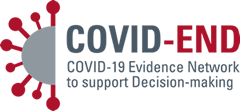COVID-END - COVID-19 Evidence Network to support Decision-making
COVID-END was a time-limited network that brought together more than 50 of the world’s leading evidence-synthesis, technology-assessment and guideline-development groups around the world. It covered the full spectrum of the pandemic response, from public-health measures and clinical management to health-system arrangements and economic and social responses. It also covered the full spectrum of contexts where the pandemic response was playing out, including low-, middle- and high-income countries.
The COVID-19 Evidence Network to support Decision-making (COVID-END) helped:
- those supporting decision-making about COVID-19 to find and use the best available evidence (i.e., to support the evidence-demand side of the pandemic response)
- researchers to avoid waste by reducing duplication in and better coordinating the COVID-19 evidence syntheses, technology assessments and guidelines being produced (i.e., to support the evidence-supply side of the pandemic response).
If you supported decision-making about COVID-19, our resources were designed specifically for you:
- inventory of best evidence syntheses (now archived) through which you could immediately find the best available (i.e., most up-to-date, highest quality, and transparently presented) evidence syntheses for each of:
- public-health measures (e.g., masks and tests)
- clinical management of COVID-19 (e.g., prescription drugs) and pandemic-related conditions (e.g., mental health and addictions issues)
- health-system arrangements (e.g., scaling capacity up or down and virtual-care alternatives to in-person care)
- economic and social responses (e.g., classroom and public-transit changes)
- horizon scans for emerging issues so you could stay ahead of challenges that other jurisdictions have already identified
- community of those supporting decision-making so you can learn from and share experiences with others
- living hub of COVID-19 knowledge hubs so you can identify organizations that are supporting decision-making with a specific topic or sectoral focus, with a specific type of resource (e.g., recommendations, evidence syntheses or data), and/or with a specific geographic or linguistic scope.
We also have a guide to COVID-19 evidences sources, resources to help you package research evidence for decision-makers, a description of a model for responding to decision-makers’ requests for research evidence in very short turn-around times, and tips and tools for responding to decision-makers’ needs.
If you are a researcher wanting to prepare an evidence synthesis or develop a guideline about COVID-19, our resources were designed specifically for you:
- priorities for new syntheses and guidelines so you can fill an important gap in what’s known and don’t contribute to unnecessary duplication
- resources for those considering and conducting COVID-19 evidence syntheses so what you prepare has a good change of making it into our inventory of best evidence syntheses and being used to support decision-making
- resources for those considering and developing COVID-19 guidelines so what you develop addresses a need and is of high quality (coming soon).
More information about COVID-END (its principles, partners, working groups, secretariat and funders) is available through the ‘About us’ menu.
